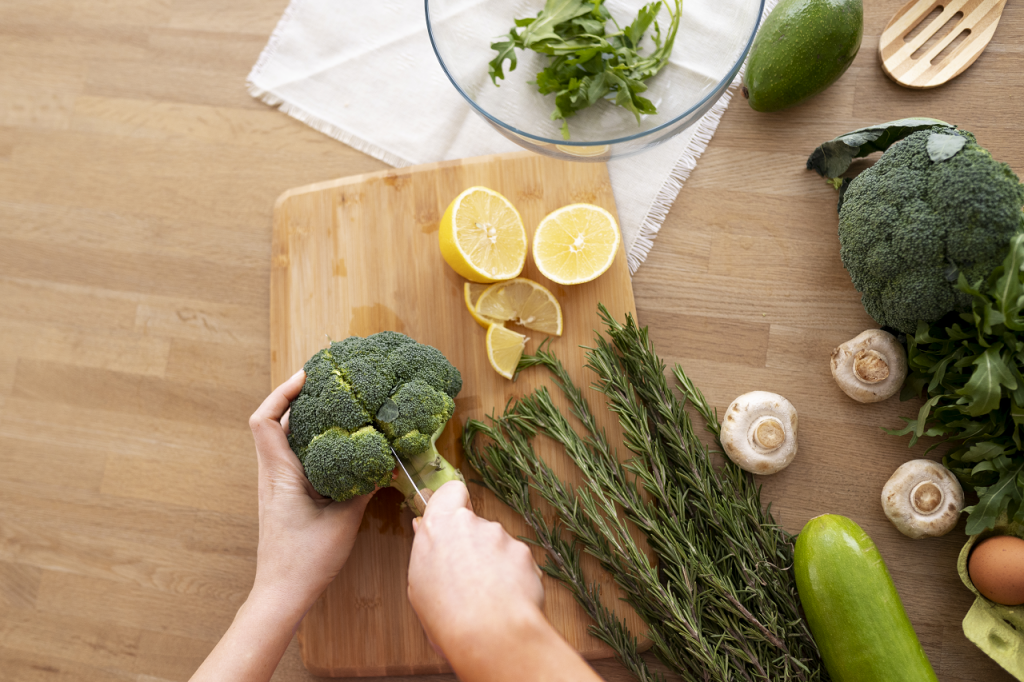Hey there, fellow plant-powered athletes! Here vegetarian runners can find their lifestyle fuels their journey from the first step to the marathon finish line. With a focus on nutrition for vegetarian athletes, insights, tips, and real-life examples are provided to help achieve running goals.
Vegetarian runners: Understanding the basics of nutrition
Nutritional foundations
Let’s kick things off with the basics. A balanced vegetarian diet for runners should focus on carbohydrates for energy, proteins for muscle repair, and fats for long-term fuel. But it’s not just about macronutrients; micronutrients like iron, calcium, and vitamin B12 play crucial roles in your overall health and performance.
We also write about: Vegetarian Vitamin D: How to Increase It in Your Diet

Common nutritional challenges for vegetarian runners
Many new vegetarian runners worry about getting enough protein. But with a variety of sources like lentils, quinoa, tofu, and tempeh, it’s easier than you think. Take Emily, a vegetarian runner who transitioned from 5Ks to marathons. By incorporating a mix of plant proteins into her meals, she maintained her muscle mass and recovery, even as her training intensity increased.
Building your Vegetarian Runner’s diet
Daily meal planning
Imagine starting your day with oatmeal mixed with chia seeds, almond butter, and fresh berries. For lunch, a quinoa salad packed with black beans, avocado, and colorful veggies. Snack on hummus and carrots, and for dinner, enjoy a hearty lentil stew. This kind of daily plan covers all your bases, providing the energy and nutrients needed for both training and recovery.
Supplement strategy
Even with a well-planned diet, some runners might need a little extra help. Supplements like B12, iron, and omega-3s (from algae oil) can fill in any nutritional gaps. Remember, it’s always best to get nutrients from food first, but supplements can be a helpful backup.
Hydration and electrolytes
Staying hydrated is non-negotiable, and for long runs, your water needs a plus-one: electrolytes. They’re essential for muscle function and hydration. Coconut water, electrolyte-infused drinks, or even a pinch of salt in your water can do the trick.
Training for your first 5K
Training basics
Starting with a 5K? Awesome choice! Begin with a mix of running and walking, gradually increasing your running intervals. Nutrition-wise, focus on complex carbs for steady energy, and don’t forget protein and fats for recovery and endurance.
Nutrition timing
Timing is everything. A banana or a small smoothie about 30-60 minutes before running can boost your energy without weighing you down. Post-run, aim for a snack or meal rich in carbs and protein within 45 minutes to kickstart recovery.
Scaling Up: From 5K to half marathon
Adjusting your diet for increased training
As your mileage goes up, so does your need for calories, especially carbs. But more food doesn’t mean just any food. Quality matters. Think whole grains, legumes, nuts, seeds, and plenty of fruits and vegetables. And hydration becomes even more crucial as your runs get longer.
Advanced supplements
Meet Sarah, a half-marathoner who noticed her energy lagging during longer runs. After consulting a dietitian, she started incorporating a vegan protein powder into her routine, boosting her recovery and performance.
The marathon challenge
Marathon training nutritional needs
Marathon training means you’re in it for the long haul, literally. Your body needs a solid foundation of carbs to fuel those long runs and protein to repair and build muscle. Don’t underestimate the power of fats, either; they’re essential for long-term energy.
Race day nutrition
Race day is where all your hard work pays off, and your nutrition strategy is key. A familiar, carb-rich breakfast will set you up for success. During the race, energy gels or chews can keep you going, but practice using them during training to avoid any surprises.
Recovery and beyond
Post-Run recovery nutrition
Your post-run meal is your recovery hero. A smoothie with vegan protein powder, fruits, and a handful of spinach can be both refreshing and restorative. Or, if you prefer solid food, a tofu stir-fry with brown rice and veggies covers all your bases.

Long-Term health and performance
Remember, being a vegetarian runner isn’t just about the races you run; it’s about a lifestyle that supports your health and the planet. Keep exploring new foods, recipes, and supplements to keep your diet balanced and exciting.
FAQs
What supplements should vegetarian runners consider?
Vegetarian runners may need to consider supplements to fill any nutritional gaps, particularly vitamin B12, iron, calcium, and omega-3 fatty acids. It’s advisable to consult with a healthcare provider to determine individual needs based on diet and health status.
How can vegetarian runners ensure they’re getting enough iron?
To increase their iron levels, vegetarian athletes have the option to incorporate into their diets a variety of plant sources rich in iron, including lentils, various beans, cereals that are fortified, spinach, and seeds from pumpkins. Pairing these iron-abundant foods with those high in vitamin C, such as oranges, strawberries, and bell peppers, can significantly improve the body’s ability to absorb iron.
Are there specific dietary considerations for vegetarian runners training for a marathon?
Yes, as mileage increases, vegetarian runners need to ensure they’re consuming enough calories, especially from carbohydrates, to fuel their long runs. It’s also important to focus on recovery nutrition, incorporating adequate protein and carbohydrates post-run to repair muscles and replenish glycogen stores.
How can vegetarian runners maintain energy levels during long runs?
Maintaining energy levels during long runs can be achieved by consuming carbohydrates before and during the run. Energy gels, chews, or even homemade energy bites made from dates, oats, and nuts are good options. Staying hydrated is also crucial.
Can vegetarian diets improve running performance?
A well-planned vegetarian diet can improve running performance by providing all the necessary nutrients for energy, recovery, and overall health. The anti-inflammatory properties of many plant-based foods can also aid in recovery and reduce injury risk.
What is the best way for vegetarian runners to recover after a hard workout?
Post-workout recovery for vegetarian runners should include a meal or snack that combines carbohydrates and protein within 45 minutes of exercise. This helps to repair muscle tissue and replenish energy stores. Good options include a quinoa and black bean bowl, a vegan protein shake, or a chickpea avocado sandwich.
How can vegetarian runners plan their meals around training schedules?
Meal planning should consider the timing of runs, ensuring that pre-run meals are light and high in carbohydrates, while post-run meals contain a mix of carbohydrates and protein. On rest days, focus on nutrient-dense foods to aid recovery and replenish nutrient stores.
What should vegetarian runners eat before a race?
Before a race, vegetarian runners should stick to familiar, easily digestible foods high in carbohydrates and low in fat and fiber to minimize gastrointestinal discomfort. Examples include oatmeal with banana, a bagel with almond butter, or a smoothie made with fruits and a plant-based protein powder.
You might be interested in: Vegetarian Full English Breakfast: Ideas to Eat Like the Gods

Conclusion
Whether you’re at the start line of your first 5K or in the final stretch to the marathon finish, your vegetarian diet can fuel your journey to success. By focusing on a balanced intake of nutrients, staying hydrated, and listening to your body, you’ll not only reach your running goals but also embrace a healthy, sustainable lifestyle. Keep pushing, keep exploring, and most importantly, enjoy every step of your running journey.
This concludes our guide “From 5K to Marathon: The Vegetarian Runner’s Journey to Success” Don’t forget, at Vegetarian Protein, we have an extensive selection of vegetarian supplements available for you to explore here. You’re always welcome to revisit and spread the word about our resources to support our expansion.



